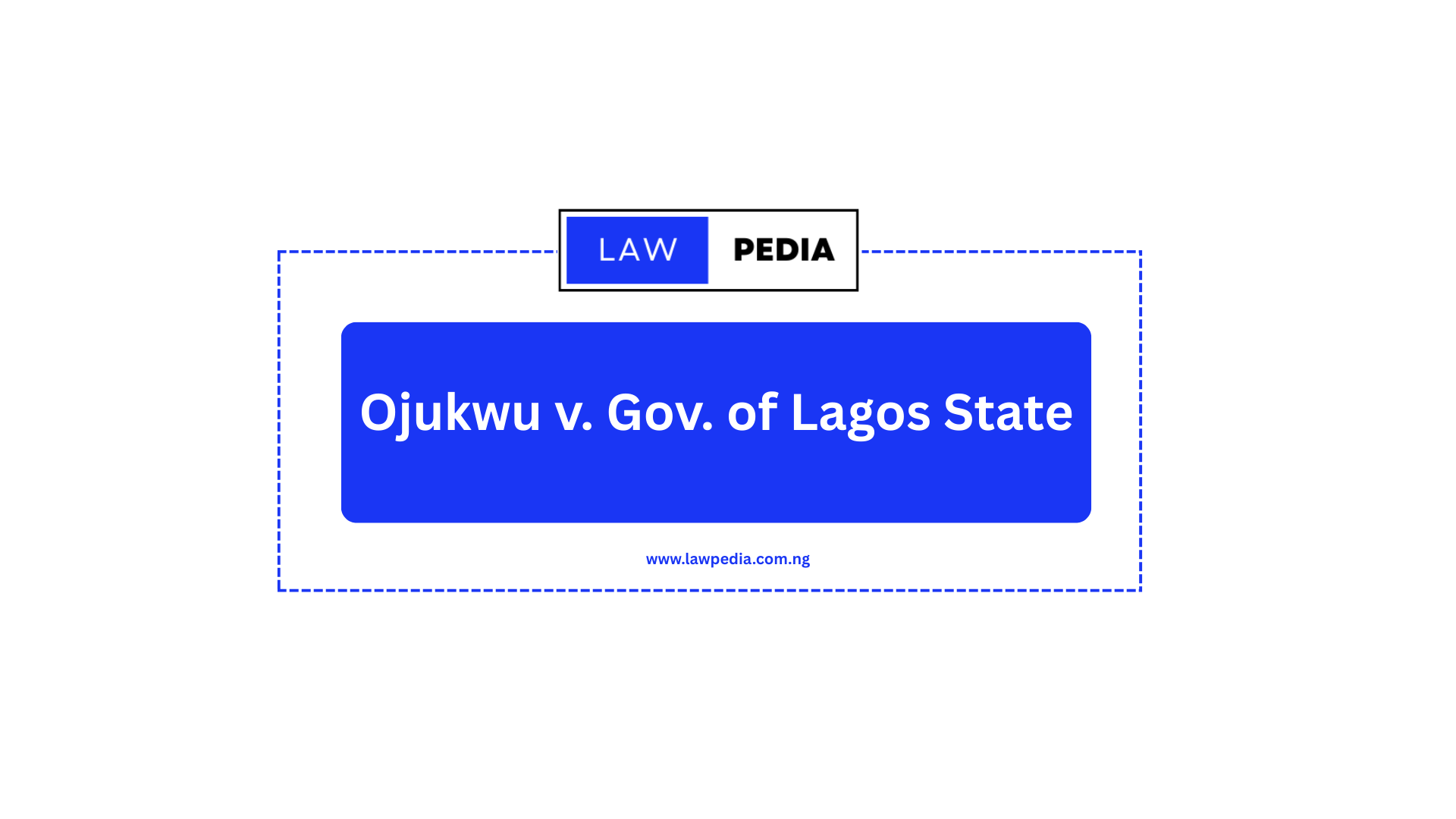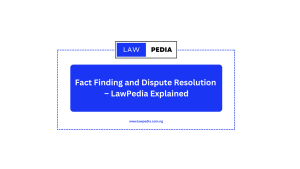Ojukwu v. Governor of Lagos State (1986): A Definitive Case Analysis for Nigerian Law Students
Introduction
In the annals of Nigerian jurisprudence, few cases have articulated the principles of the rule of law and due process as powerfully as Ojukwu v. Governor of Lagos State (1986). This landmark decision by the Court of Appeal serves as a bulwark against executive arbitrariness and underscores the judiciary’s role as the guardian of justice. For law students, this case is not merely a subject of academic interest but a practical lesson in the application of constitutional principles to real-world scenarios. It exemplifies how the law can serve as a shield for citizens against governmental overreach, making it an indispensable part of legal education in Nigeria.
Historical and Legal Context
To fully appreciate the significance of this case, one must consider the political climate of Nigeria in the mid-1980s. The country was under military rule, a period characterized by the concentration of power in the executive branch and frequent disregard for judicial processes. Against this backdrop, the actions of the Lagos State Government in seizing property belonging to Chief Chukwuemeka Odumegwu Ojukwu—a prominent historical figure—highlighted the tensions between state power and individual rights. The government’s reliance on the Abandoned Properties Act to justify its actions was seen by many as part of a broader pattern of executive high-handedness, making the court’s intervention all the more critical.
Detailed Narrative of the Case
The dispute began when the Lagos State Government issued a notice declaring Ojukwu’s property in Ikoyi abandoned and therefore subject to acquisition by the state. Ojukwu, then in exile, challenged this action through legal channels, filing Suit No. LD/876/84 in the Lagos State High Court. He argued that the property was not abandoned and that the government’s acquisition was unlawful. While this suit was still pending, agents of the state government forcibly took possession of the property, ejecting Ojukwu’s caretaker and other occupants. This move was not only aggressive but also premature, as the court had yet to rule on the legality of the acquisition.
In response, Ojukwu’s legal team sought an ex parte injunction from the High Court, which was granted by Justice Dolapo Akinsanya. This injunction explicitly restrained the government from further action until the substantive suit was resolved. However, the state government openly defied this order, continuing to occupy the property and even moving its personnel into it. This defiance was not just a violation of a court order but a direct challenge to the authority of the judiciary itself.
Legal Issues Explored
The case raised several pivotal legal questions that went to the heart of administrative and constitutional law:
- The Sanctity of Judicial Proceedings: Can a party, especially the government, unilaterally alter the status quo while litigation is ongoing? The court emphasized that once a matter is sub judice, no party should take actions that could prejudice the outcome or undermine the judicial process.
- Obedience to Court Orders: Is the government bound to comply with interim orders, such as ex parte injunctions? The court affirmed that such orders are legally binding and must be respected until they are varied or set aside by a higher court.
- Due Process and Executive Authority: Does the government have the right to enforce its claims without a judicial determination? The court rejected the idea that the executive could act as judge and enforcer in its own cause, stressing that due process must be followed in all circumstances.
- Equality Before the Law: Are government entities subject to the same legal standards as private citizens? The judgment reinforced that the rule of law applies equally to all, and the government cannot invoke its authority to bypass legal obligations.
Judicial Reasoning and Analysis
The Court of Appeal’s judgment was grounded in a robust analysis of constitutional and administrative law principles. The court drew on the doctrine of separation of powers, highlighting that the judiciary’s role is to check executive excesses and protect citizens’ rights. It cited earlier precedents, such as Lakanmi v. Attorney-General, which affirmed that executive actions must conform to the law.
The court also explored the concept of the rule of law, noting that it requires all state actions to be based on legal authority and subject to judicial review. The government’s failure to obey the ex parte injunction was deemed “executive lawlessness,” a term that has since become synonymous with violations of judicial authority.
In its reasoning, the court underscored the symbolic role of the government as a model of compliance with the law. When the state flouts court orders, it erodes public confidence in the legal system and sets a dangerous precedent for anarchy. The judgment thus served not only to resolve the immediate dispute but to reaffirm the foundational values of a democratic society.
Broader Implications and Legacy
The impact of Ojukwu v. Governor of Lagos State extends far beyond its immediate context. It has been cited in numerous subsequent cases involving executive accountability and judicial independence. For example, in more recent disputes over government disregard for court orders, this case is often invoked to emphasize the non-negotiable duty of compliance.
In legal education, the case is a cornerstone of the curriculum for courses on constitutional law, administrative law, and jurisprudence. It provides students with a concrete example of how abstract principles like the rule of law and due process are applied in practice. Moot court competitions frequently feature hypotheticals based on this case, challenging students to argue issues of executive authority and judicial oversight.
Moreover, the case has influenced legislative and policy discussions around the need for clearer mechanisms to enforce court orders against government entities. Some legal scholars have argued that the principles in Ojukwu should be codified to prevent future violations.
Critical Perspectives
While the case is widely celebrated, it has not been without criticism. Some commentators note that the judgment did not fully address the practical challenges of enforcing court orders against a recalcitrant government. In the years since the decision, there have been instances where government agencies continued to ignore judicial directives, raising questions about the efficacy of judicial rulings in the face of executive defiance.
Others argue that the case’s emphasis on procedural fairness may sometimes overlook substantive injustices. For example, in situations where the government acts in the public interest but bypasses due process, a rigid application of the Ojukwu principles could hinder necessary actions. However, these criticisms are often outweighed by the broader consensus that due process is essential to prevent abuse of power.
Conclusion: Lessons for Aspiring Lawyers
For law students, Ojukwu v. Governor of Lagos State offers timeless lessons. It teaches the importance of vigilance in protecting judicial authority and the need for courage in challenging power. It also illustrates the practical skills of legal argumentation, such as how to frame issues, cite precedents, and persuade courts to uphold fundamental principles.
As you study this case, consider how its principles might apply in contemporary contexts, such as disputes over land acquisition, human rights violations, or governmental corruption. Reflect on the role of lawyers as advocates for justice and the responsibilities of the judiciary in maintaining the balance of power.
Ultimately, Ojukwu is more than a case; it is a testament to the resilience of the rule of law in the face of adversity. It reminds us that in a democracy, no one is above the law, and justice must always be pursued through lawful means.
Read more here



